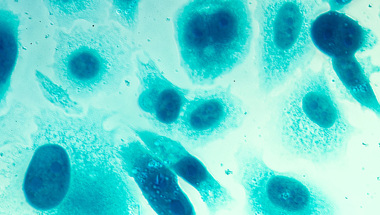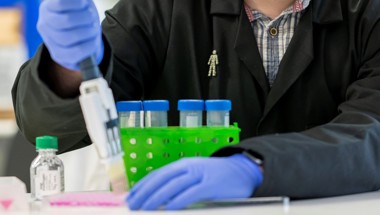
Which prostate changes can predict the development of prostate cancer?

Grant information
Reference: TLD-CAF24-004
Researcher: Dr Sarah Gosling
Institution: Keele University
Award: £323,742
What you need to know
- This project is looking at small changes to prostate tissue that sometimes lead to cancer, and whether there’s a way to tell in advance which of these changes will (or won’t) turn cancerous.
- Dr Gosling will analyse the structure of prostate samples closely, looking for tiny changes that regular tests can’t see.
- If successful, the research could help doctors decide which men need treatment or monitoring and which don't. This could reduce the number of missed diagnoses for the first group, as well as the number of unnecessary tests for the second.
About Dr Sarah Gosling
Dr Gosling completed her master’s degree in biosciences at the University of Durham, before moving to Cranfield University to undertake a PhD.
Her PhD looked at whether small deposits of calcium (known as calcifications) in the breast could be used to predict the development and recurrence of breast cancer. This research led her to investigate calcifications as an early indicator of other types of cancer, such as prostate cancer.
Since finishing her PhD in 2022, Dr Gosling has been working as a postdoctoral researcher at Keele University, where she will be based for this project. In that time, Dr Gosling has been working on further advancing our knowledge of calcifications and their link to prostate cancer. This grant will enable her to extend this promising research as an independent researcher.
Why are we funding this research?
This research is crucial because it addresses a significant challenge in prostate cancer care: predicting which cases of a condition called high-grade prostatic intraepithelial neoplasia (HGPIN) will develop into cancer.
HGPIN is where the cells lining the prostate look abnormal under a microscope. These changes are not cancer, but they are considered a warning sign because they can sometimes develop into prostate cancer in the future.
Unfortunately, right now doctors can't reliably tell which men with HGPIN will go on to develop prostate cancer. This uncertainty means many men undergo frequent and stressful tests, like biopsies, which can come with their own health risks.
This fellowship will allow me to develop my own research niche and establish my independence, alongside uncovering new biomarkers for prostate cancer. The project will provide a deeper understanding of the prostate tissue microenvironment and long term, could help detect prostate cancer sooner and identify new targets for therapies.
What will Dr Gosling do?
In this project, Dr Gosling aims to improve how we predict which cases of HGPIN will develop into prostate cancer.
To do this, she will study nearly 400 samples taken from prostates, including samples that show HGPIN, samples of prostate cancer, and ‘normal’ samples (i.e. neither HGPIN nor cancer). She’ll study these samples using techniques that can detect tiny changes in their molecular structure, which are too small for traditional methods like MRI scans and biopsies to see. This will help her understand the differences between cases of HGPIN that do and don’t become cancerous.
Dr Gosling will focus on two main things: collagen and calcifications. Collagen acts like cellular scaffolding, helping to maintain the structure of our organs, and changes in it have been linked to cancer. Calcifications are small deposits of calcium. In the context of prostate cancer, the presence and type of calcifications can provide clues about the progression of the disease.
By analysing these components, Dr Gosling hopes to find specific indicators that can predict whether a case of HGPIN will turn into cancer. She also aims to create a tool to predict the chances of a sample progressing to cancer based on these findings.
For this project, Dr Gosling will work closely with Dr Charlene Greenwood at Keele University, as well as with three mentors at other institutions. Dr Jake Brooks, at the University of Warwick, investigates the role of trace metals in Alzheimer’s disease, and so will share his understanding of how metals can play a part in disease, as well as his knowledge of how to analyse samples. Dr Joel Greenberg, the CEO of Quadridox Inc, will offer her access to his company’s state of the art X-ray scanning equipment. And Professor Iain Lyburn, at Gloucestershire Hospitals NHS Foundation Trust, will share with Dr Gosling his experience in analysing scan data to predict and detect the development of cancer.
How will this benefit men?
Ultimately, the goal of this research is to develop new tests that can more accurately spot which men with HGPIN are at risk of developing prostate cancer. This could lead to more personalised treatment plans, reducing unnecessary tests and anxiety for those men who are not likely to develop prostate cancer. For those men who are at risk of developing cancer, this research has the potential to improve early detection and treatment – thereby saving men’s lives.
Help us fund more research like this
Your donation helps us fund lifesaving research that's improving the way we diagnose prostate cancer.



